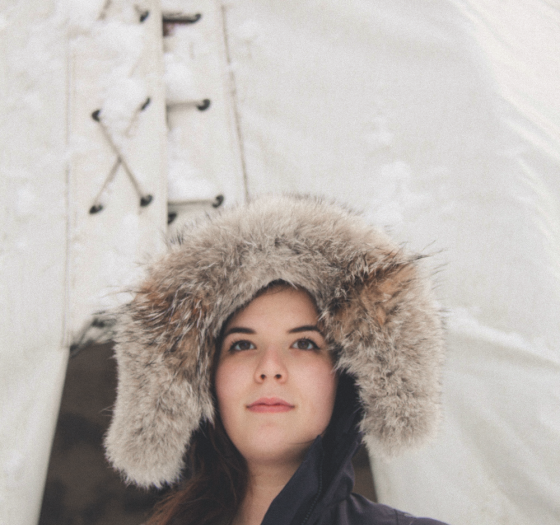
Isabelle Wallace found her voice as a nurse and advocate at the bedside of a patient who had lost his legs to diabetic amputation.
The elderly man at Edmundston Regional Hospital in New Brunswick was determined to recover quickly, so Wallace, then in her last year as a nursing student in 2016, pushed the hospital to install a triangle-shaped support above his bed so he could lift himself up and begin rehab sooner. “That was the beginning of my advocacy career,” she says.
After two months of care, and before he left the hospital, the man expressed gratitude in a way Wallace will never forget.
“He told me I made a difference,” she says. “He took my hands (in his) and cried. I cried too.” This is nursing, she thought.
Wallace grew up outside Edmundston in Madawaska Maliseet First Nation. Her home was next to the reserve’s health centre, where a friendly public health nurse left a positive impression. Wallace’s grandmother, a French-Canadian who married an Indigenous man and raised three of her four children on the reserve, had taken on key roles for that Maliseet First Nation, preserving genealogical history, helping administer elections, and working as a translator.
Wallace began to study nursing in 2012 at Université de Moncton, where she was the only Indigenous student in a class of about 20. By 2013, she wanted to join Doctors without Borders. Two years later, she travelled to Haiti to provide care. That experience taught her that public health must be shaped by local conditions. She had been directed to teach locals how to properly wash their hands even though many had no access to running water.
“I developed cultural humility,” she says.
It was after she returned home in 2015 and read the report from the Truth and Reconciliation Commission that she realized the abject poverty she found abroad existed in many Indigenous communities in Canada.
“I cried. I felt so ashamed. I couldn’t believe I wasn’t doing anything for my people,” she says. “We have third world conditions in Canada."
Growing up in a relatively prosperous First Nation surrounded by strong and supportive family, Wallace did not learn until adulthood that some Indigenous communi-
ties lack basic needs like running water.
Those needs are not served in a Canada where First Nations people too often are treated like second-class citizens, something Wallace has witnessed first-hand because some people around her, unaware that she is Indigenous, make racist remarks.
“I have fair skin and I don’t have stereotypical Indigenous features,” she says.
It was at nursing school that a professor, France Chassé, connected her with an Indigenous mentor, Michèle Parent-Bergeron, who awakened Wallace to the unmet health needs of First Nation communities. Parent-Bergeron and the nursing school arranged for Wallace to work for a month in such a community in northern Manitoba.
In 2016, Wallace was accepted as a master’s student at the University of Ottawa. Working with Marilou Gagnon, an RN, professor and vocal advocate for marginalized people, Wallace set out to change the way nurses are educated so that knowledge of Indigenous communities and values are incorporated into nursing curriculum. The nursing school at Université de Moncton is just kilometres from Madawaska Maliseet First Nation, but the two might as well be worlds apart because many at the school know little about life on the reserve.
Wallace has dedicated her career to improving the well-being of Indigenous peoples, working with the Canadian Indigenous Nurses Association and raising money for Indigenous education and research through the Canadian Nurses Foundation.
Her own path will take her to RNAO later this year, where she will work with CEO Doris Grinspun as a recipient of the Hub Fellowship, a one-week shadowing experience that will allow her to see the strategic advocacy of RNAO up close. She will take what she learns at RNAO back to New Brunswick, where she is a liaison to First Nation communities and the lead of First Nations issues at the New Brunswick Health Council.
“RNAO has been a leader in nursing in Canada and internationally,” Wallace says. “The advocacy…I haven’t seen anything like it before. It’s inspiring.”
